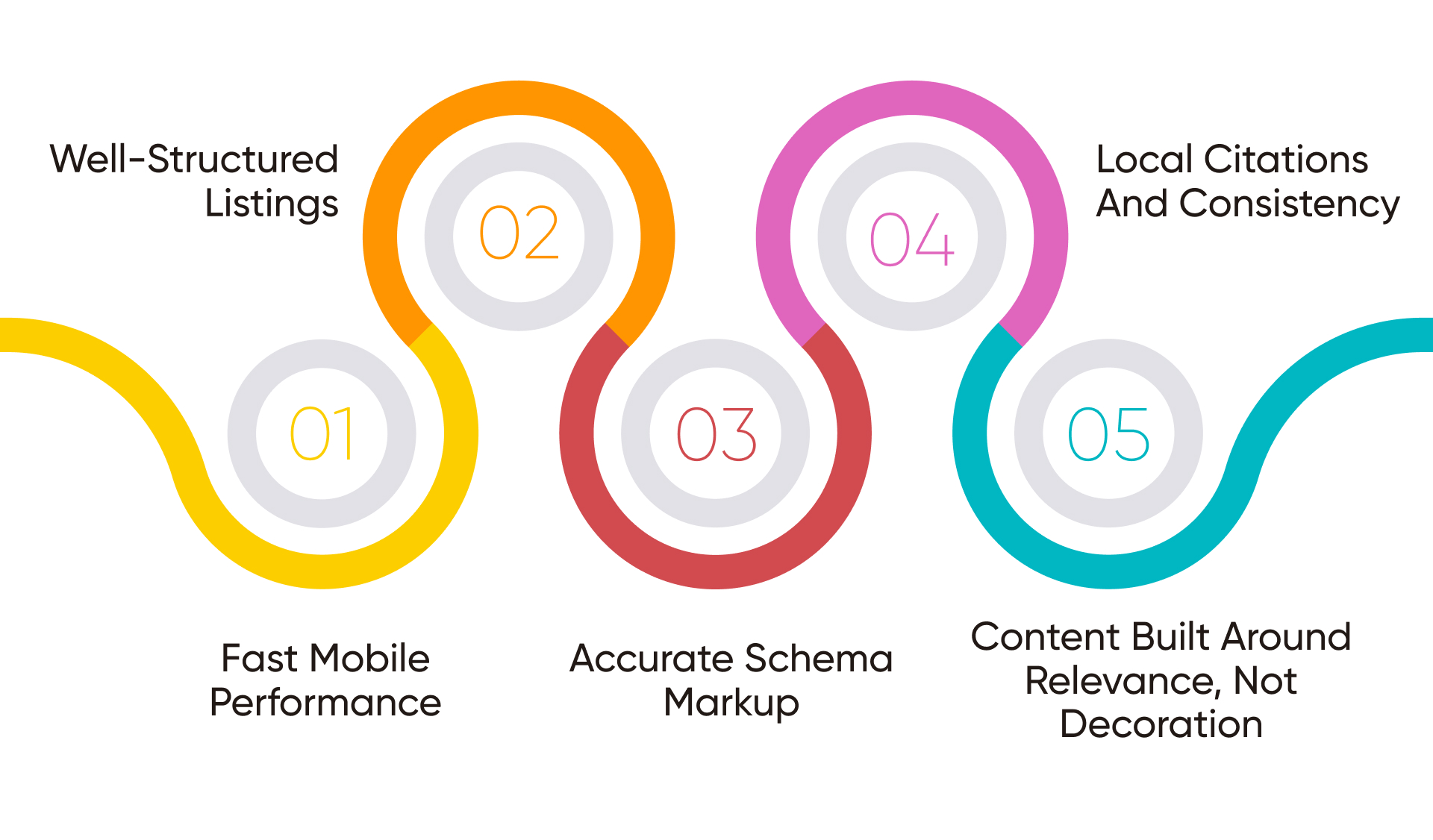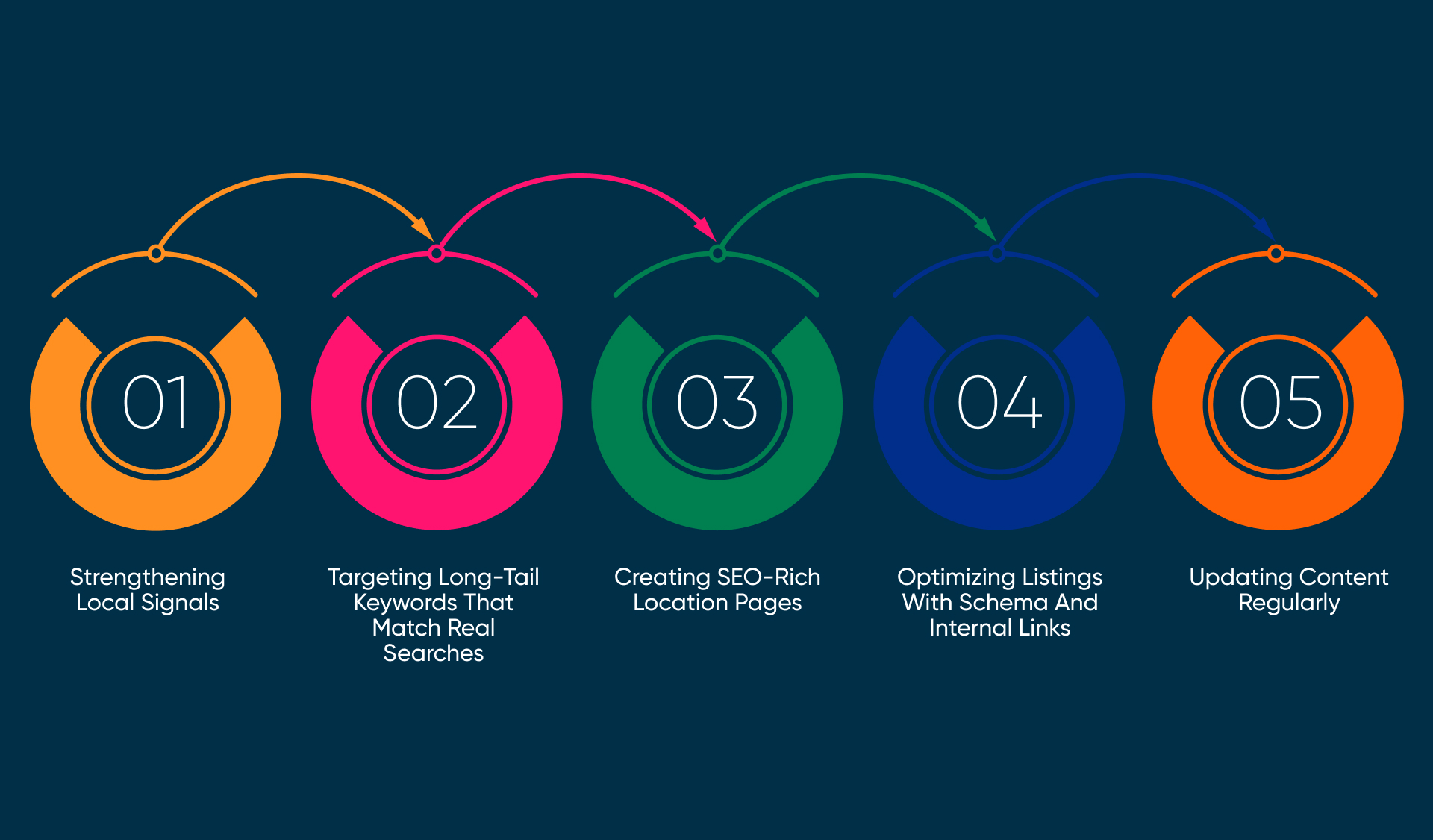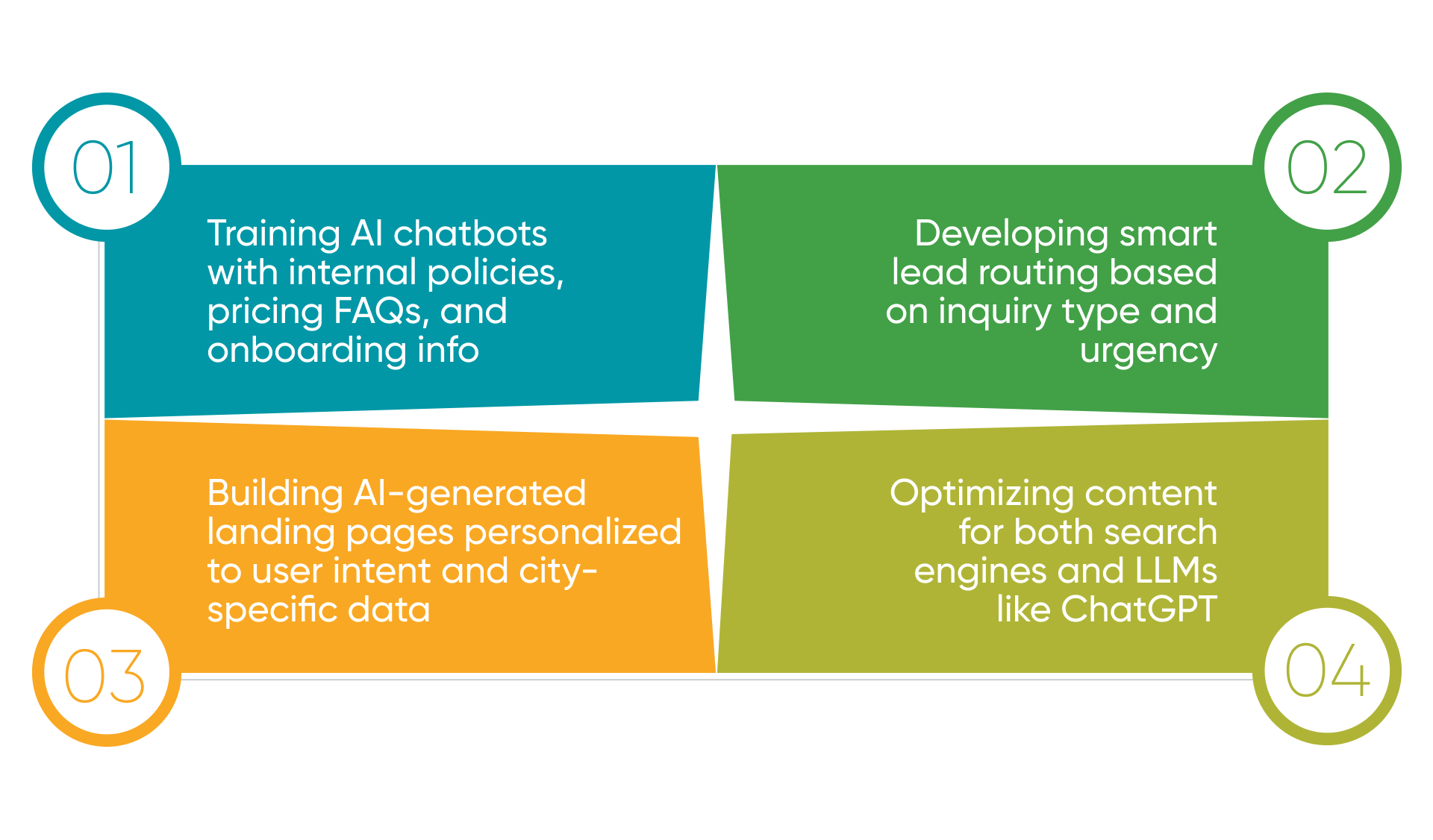How to Improve SEO on Property Management Company

 9.5 min
9.5 min
In a market where digital visibility determines trust and growth, every property management brand is fighting for the top spot online. That competition is no longer about having a website and a few listings. It’s about ranking when prospective tenants, landlords, or investors search for solutions. And at the center of that digital climb is one question: how to improve SEO on property management company websites without resorting to outdated tactics or generic strategies.
Search engines reward relevance, structure, and authority. For property firms handling dozens or even hundreds of properties, getting SEO right means building a system that works quietly behind the scenes. This blog breaks down the steps that matter, the signals Google and AI-powered engines pay attention to, and the role of smarter tools like AI in boosting long-term rankings.
Understanding the Basics of SEO for Property Management

Before exploring advanced strategies, it helps to get clear on why SEO for property management is its own kind of challenge and opportunity. Unlike general digital marketing efforts, this niche is rooted in location, credibility, and operational efficiency. Whether managing a dozen apartments or a hundred multi-unit complexes, one reality stays the same: most leads begin with a local search.
People don’t just search for “property manager.” They search for “property management near me,” “rental management in Austin,” or “best property manager in South Delhi.” That geographic layer is the core reason property management SEO works differently than SEO for a product or national service brand.
In every city, there are hundreds of agencies trying to rank for the same pool of keywords. But only a few show up and even fewer inspire enough trust to convert clicks into inquiries. That’s where local SEO company meets intent-focused optimization. And getting it right means more than inserting the right words on a homepage.
To compete and win at property management SEO, several non-negotiables must be in place:
- Fast mobile performance: Search engines reward pages that load quickly, especially on phones. Slow websites mean lost leads.
- Well-structured listings: Property pages must be crawlable, with clear titles, meta data, and consistent formatting. If search engines can’t understand the listing, neither can users or AI assistants.
- Accurate schema markup: Rich snippets (like star ratings, pricing, and location) boost visibility. Schema makes content easier for both Google and large language models to categorize.
- Local citations and consistency: Business directories, Google Business Profile, and location references must all be in sync. This signals trust and local legitimacy.
- Content built around relevance, not decoration: A beautiful site won’t matter if it doesn’t answer questions, solve problems, or reflect real-world expertise.
When all of this works together, a property company isn’t just online it’s discoverable, trusted, and positioned for growth. That’s the foundation of how to improve SEO on property management company websites in a digital-first market.
Want More Leads for Your Property Management Firm?
Discover how targeted SEO strategies can turn your website into a lead-generating machine for your property business. Let us analyze your digital performance today.
Request Your Free SEO Audit
Answering the Big Question: How to Improve SEO on Property Management Company Websites?

There’s no single switch to flip. Instead, improving SEO is a layered process that stacks results over time. Below are the strategic pillars that directly impact how to improve SEO on property management company websites.
1. Strengthening Local Signals
Google needs to trust that a business is truly local to the area it claims to serve. That means building strong local citations, consistent NAP (Name, Address, Phone) data across directories, and managing a Google Business Profile with up-to-date information.
2. Targeting Long-Tail Keywords That Match Real Searches
Content should be based on real-world questions: “How much does a property manager cost in Chicago?”, “What does full-service property management include?” Pages that answer these naturally tend to rank better. That’s where property management SEO becomes more about serving than selling.
3. Creating SEO-Rich Location Pages
Agencies operating in multiple cities should not use duplicate service pages. Each location page should have unique, helpful content. Doing so plays a key role in how to improve SEO on property management company structures that span regions or states.
4. Optimizing Listings with Schema and Internal Links
Each listing should be indexable, structured with schema, and linked back to the relevant neighborhood or service page. Googlebot sees this structure as a sign of trust and content depth.
5. Updating Content Regularly
Evergreen blogs, rental guides, landlord checklists, and maintenance tips serve a dual purpose they help users and signal relevance to search engines. This is one of the underrated ways in how to improve SEO on property management company sites that have already been established for years.
Why Property Management SEO Needs an AI-Ready Mindset
The way people search for property services is changing quietly but dramatically. Search engines are no longer the only source people turn to when they need answers. Tools like ChatGPT, Bing’s Copilot, Perplexity, and Google’s Gemini are stepping in. They don’t just list results they respond.
That shift has made property management SEO more layered than it used to be. It’s not just about helping a website rank well anymore. Now, it’s also about whether the information on that site can be found, trusted, and used by AI tools.
Traditional tactics adding keywords here and there, posting a few local blogs, tweaking metadata aren’t enough to stay ahead. Search has grown smarter. So have the users. And so have the machines giving them answers.
The idea of SEO for property management now includes something broader: preparing content to be picked up by language models. These models read content differently than a search bot. That’s where Answer Engine Optimization, or AEO, starts to matter.
This doesn’t replace classic SEO. It builds on it. For property companies trying to figure out how to improve SEO on property management company websites, ignoring this shift would be a mistake. The firms that adapt early will find themselves appearing not just in search results but in the answers people trust the most.
Ready to Attract More Property Owners Online?
Most property management sites lack targeted SEO. Fill out this quick form to get a personalized plan for reaching high-intent clients in your area.
Claim My SEO Plan
How Edifying Voyages Helps Property Businesses Grow with SEO
Edifying Voyages works with property management firms that are serious about growth, not just traffic. With over 15 years of digital expertise, the team blends data-driven SEO with real estate knowledge to create visibility strategies that generate real results. Whether collaborating with local firms or acting as a trusted organic SEO company for real estate portfolios, the agency prioritizes real-world outcomes over vanity metrics.
What sets the agency apart?
- Tailored content strategies built around actual search intent in the property space
- Technical SEO audits focused on crawlability, speed, and schema markup
- Geo-targeted optimization for agencies managing properties across different cities
- Content clusters that drive topical authority (e.g., landlord tips, tenant guides)
- AI-adapted SEO that prepares websites to be referenced in AI-generated answers
Whether the goal is to rank in local search, get featured in voice search, or build trust with potential clients online, Edifying Voyages builds roadmaps that align with it all.
AI Implementation That Actually Drives SEO for Property Management

Many agencies claim to use AI but Edifying Voyages has made it work on the ground. Their approach to AI implementation isn’t about adding another tool it’s about reshaping how a business communicates online.
For property firms, this means:
- Training AI chatbots with internal policies, pricing FAQs, and onboarding info
- Developing smart lead routing based on inquiry type and urgency
- Building AI-generated landing pages personalized to user intent and city-specific data
- Optimizing content for both search engines and LLMs like ChatGPT
This AI-backed layer gives clients a competitive edge. Not only do they rank well on Google, but they also start showing up as trusted sources in AI responses, something that’s reshaping how to improve SEO on property management company sites in 2025 and beyond.
Is Your Website SEO-Friendly for Property Searches?
Search engines need structure to recommend your listings. We’ll evaluate your site’s SEO performance and suggest actionable fixes.
Audit My Website SEO
Improve SEO on Property Management Company in Today’s Digital Landscape
SEO in the property world isn’t what it used to be. There was a time when a few well-placed keywords and a listing on Google Maps might have been enough. Not anymore. Property management firms are now competing in a digital space that’s noisier, faster, and more dependent on trust signals than ever before. Some firms turn to an offshore SEO company to manage this complexity cost-effectively, but success comes from alignment: understanding the property market, local nuances, and how to build digital systems that scale naturally and stay adaptable to future algorithms.
These days, it’s not just about showing up in search it’s about showing up right. That means being visible in the right places, at the right time, with the kind of content that actually answers what someone’s trying to figure out. And not just for Google. AI platforms ChatGPT, Perplexity, Copilot are now pulling content directly into answers, skipping traditional search steps altogether.
So what does that mean for property management websites?
For starters, the basics have to be airtight: technical setup, local accuracy, crawlable listings, and schema. But there’s also the broader question does the site genuinely reflect what’s happening on the ground? Does it help someone understand how a management service works in their area? That’s the gap where many fall behind.
Improving visibility isn’t a one-off task. It’s not a campaign. It’s ongoing work editing, updating, refining. Pages should speak to specific neighborhoods, not just city names. Listings should link back to service content. The site should feel alive, not frozen in time.
And honestly, trying to do all of that in-house, while managing properties day to day? It’s a lot.
That’s why working with a team like Edifying Voyages changes the game. Instead of just doing “SEO tasks,” they look at the bigger picture how everything connects. Technical SEO, content structure, AI readiness it’s handled. And most importantly, it’s done in a way that doesn’t just chase rankings but supports long-term business goals.
For any firm wondering how to improve SEO on property management company websites today, the answer isn’t in trends or tricks. It’s in clarity, focus, and a partner who understands both the digital landscape and the pressures of the property business.
FAQs
The 4 P's of property management People, Price, Product, and Promotion help evaluate why leasing performance may be lagging. It looks at staff quality, rent competitiveness, property appeal, and marketing effectiveness.
Site structure isn’t just technical; it shapes how easily people and search engines can navigate listings. Clean internal links, fast mobile loading, and schema make a big difference. In this space, structure builds both trust and visibility.
Fresh content shows the brand is active and informed. Regular updates like rental tips or local insights keep the site relevant. It’s not just good for rankings; it builds long-term credibility too.
Schema helps search engines understand a listing's details, such as price, reviews, or availability. It’s what turns plain listings into rich results. More clarity means more clicks, especially in competitive markets.




